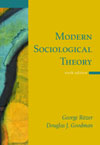
Symbolic Interactionism |  |
Learning Objectives
discuss the historical roots of symbolic interactionism, including pragmatism and behaviorism; |
discuss the ideas of George Herbert Mead, particularly the concepts he discusses in Mind, Self and Society: the differences between the play stage and game stage in child development, how the "generalized other" emerges, and what Mead meant by "I" and "me"; |
explain the seven basic principles of symbolic interactionism, including the concepts of socialization; physical, social, and abstract objects; symbols; covert and overt behavior; the definition of the situation; and the looking-glass self; |
discuss the work of Erving Goffman, including Stigma and Frame Analysis; |
explain Goffman's dramaturgical approach to studying everyday life, including his idea of impression management; |
discuss the criticisms that have been raised concerning symbolic interactionism and describe the various ways that symbolic interactionists have responded to these criticisms (e.g., redefining Mead's theoretical orientation, integrating micro- and macro-level phenomena, and synthesizing symbolic interactionism with cultural studies); and |
discuss the potential future of symbolic interactionism as a sociological theory. |
|
|